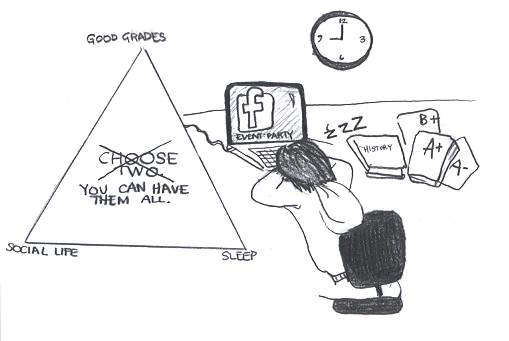You woke up in the morning having no desire to go to school at all. Despite begging your parents since seventh grade to let you go to Kerr, today you didn’t want to take a step near that school. You’re exhausted; you told yourself that late PAKs were the reason for your loss of sleep, but that doesn’t explain why you woke up with your face on the keyboard of your laptop with an Internet browser open to Facebook.
For those of us stuck in a daily routine of unproductiveness, getting our work done can seem hopeless. It does not have to be an uphill battle, however. There’s no doubt that avoiding procrastination altogether would bring us closer to achieving our greatest academic potential; but we could also improve our academic standing by just managing procrastination. We are all adolescents with similar mental capacities and similar tendencies towards irresponsibility, including procrastination. As students, what separates us is our ability to balance schoolwork with the other aspects of our lives, and we don’t necessarily need a gifted or creative mind to learn how to better manage daily affairs.
Our daily routine at school and home contributes significantly to our success, and if we changed it slightly every day, we could change our entire routine. Gradually, we could phase out the things that prevent us from finishing work on time, and time management would seem more natural.
Instead of logging on to Facebook the minute you get home, force yourself to get out your textbooks and PAKs and start working, no matter how tired, hungry, or unfocused you seem to feel. When you’re working late at night, stay in an area where you won’t be tempted to pursue recreational activities or take a short nap, only to wake up tomorrow morning. If you’re not allowed to stay up late, force yourself to finish work before bedtime—no matter how flawed the work may seem.
Of course, our individual routines will differ, and it is up to us to find out specifically what we need to change. Thinking about what we need to do will be easy, but actually carrying out these changes will be where we struggle.
Part of the process of any self-improvement effort requires us to alter our worldview. What we perceive and what we experience make up our reality. We trust that what consistently happens to us will continue to happen, and as a result, we form a worldview based on such events. If we are not doing well consistently, it is hard to believe that we can ever do better. That means that if you consistently do not turn in work, it is hard for you to believe that you can turn in work on time.
So yes, the process of changing your daily routine will be discouraging, and in reality, few of us succeed in doing so. That is why there exists a clear separation between students who consistently maintain high grades and students that do not; students with lower grades don’t tend to suddenly start making straight A’s nor do students who consistently make high grades tend to suddenly fail in all of their classes.
But it is useless to spend all your time thinking about success. It is when you start wondering whether your life will always be the same, whether you will always fail, that you perpetuate your daily routine.
The best any of us can do is to stop thinking about these things and just repeat our attempts to change.



